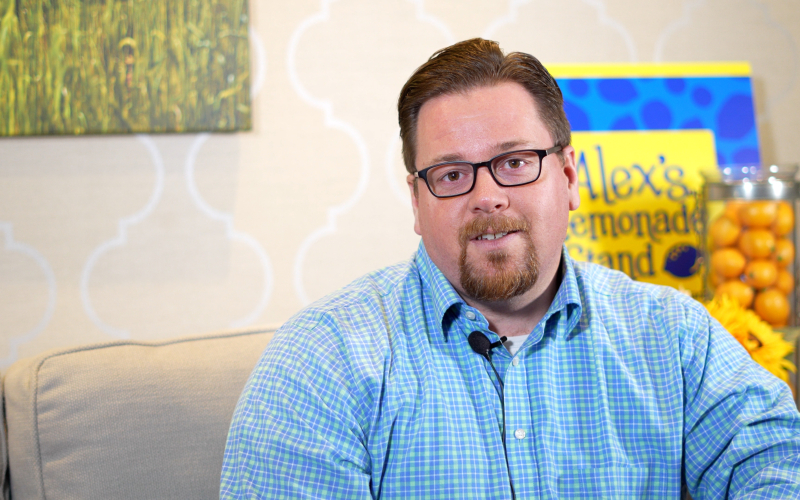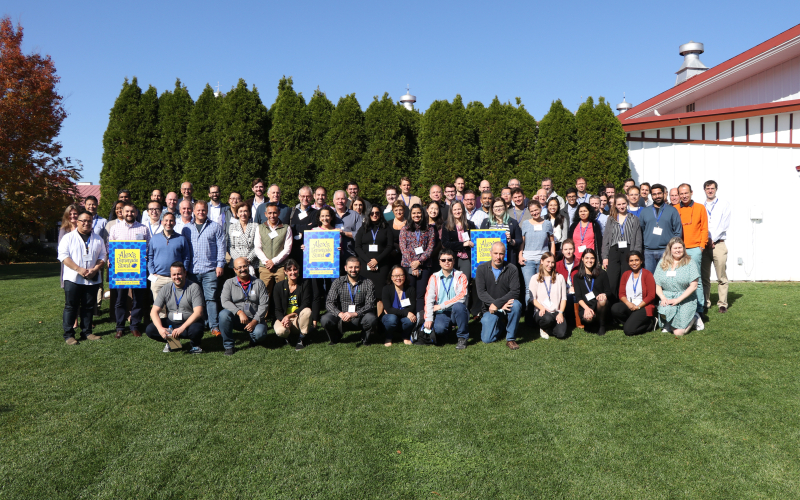By: Trish Adkins
Dr. Ryan Roberts, an oncologist and researcher from Nationwide Children’s Hospital, sees the havoc childhood cancer reigns on children and their families every day.
“It causes long, painful, and sometimes futile battles for kids. Some of my patients spend the entirety of middle school and high school on chemotherapy, ultimately unsuccessfully,” said Dr. Roberts.
Dr. Roberts specializes in the treatment of osteosarcoma, the most common, but still rare, pediatric bone cancer that happens primarily in adolescents. While surgical techniques have improved over the past several decades, the standard of care -- chemotherapy -- established forty years ago hasn’t changed. There have been huge efforts to find new, more effective treatments, but they’ve all been unsuccessful.
“We spent a long time trying to treat the primary tumor, but we haven't spent a lot of time thinking about how these tumors travel to different organs where they shouldn't be growing and start growing there. If we focus on stopping that, we could change everything,” said Dr. Roberts.
Now, Dr. Roberts is focusing on just that: understanding and targeting the biological underpinnings of metastatic osteosarcoma.
Roberts is part of a dream team of childhood cancer researchers from all specialties and all over the world funded by the Alex’s Lemonade Stand Foundation (ALSF) Crazy 8 Initiative.
The Crazy 8 Initiative, with support from partner Northwestern Mutual, has provided $26 million in grant funding to six projects led by researchers at 21 institutions all over the world. These researchers are working together to study the most pressing and most deadly problems in childhood cancer, finding treatments for all types of childhood cancers, including osteosarcoma, Ewing sarcoma, leukemias, brain tumors and neuroblastoma.
Global Collaboration of the Best of the Best
The Crazy 8 projects are more than just projects with big ticket funding; these are projects that bring together everyone from computational biologists to geneticists to clinician-scientists to solve the most pressing problems in childhood cancer.
Typically, researchers would need to write multiple smaller grants over ten years to get the resources and recognize the impact that the Crazy 8 offers, as there are very few funding programs that allow for large-scale team projects in pediatric cancer. The Crazy 8 allows pediatric cancer researchers to bring it all together and pursue big, risky ideas that have the potential to translate into major successes for children who are desperate for cures.
Teams are made up of specialists from all realms working together within their own projects and also collaborating with each other across institutions, teams and oceans.
The Six Projects
The Crazy 8 first provided funding to four projects in 2021; then added two more last year to fulfill its commitment of spending $26 million for pediatric cancer research. ALSF has plans to continue expanding the program and funding more projects.
In addition to Dr. Roberts’ osteosarcoma team, which is led by Dr. Rani George from the Dana-Farber Cancer Institute, one other team is also studying osteosarcoma but from a different angle. Led by Dr. Alejandro Sweet-Cordero at the University of California San Francisco, the other osteosarcoma team is studying how osteosarcoma cells survive when they spread from the primary tumor site.
Dr. Charles Mullighan at St Jude Children’s Research Hospital is studying something called molecular glues -- a compound that binds to the molecular drivers of cancer turning those drivers from cancer-causers to cancer-degraders. The team led by Dr. Leonard Zon from Boston Children’s Hospital is using barcode technology to track the development, growth and spread of leukemia cells.
In Vienna, the Crazy 8 research team led by Heinrich Kovar, PhD at St. Anna Children’s Cancer Research Institute, is studying Ewing sarcoma, another type of pediatric bone cancer for which there has been little progress in the past several decades.
Dr. Yael Mossé at Children’s Hospital of Philadelphia leads the team that is studying and targeting the oncoprotein MCYN. Science has known about MCYN for years — calling it undruggable, a discouraging label. But for Dr. Mossé, enormous discoveries in science, new technologies and now, the collaboration made possible by the Crazy 8, have given her hope.
“Hope is what gets us up in the morning. It’s what gives us the passion, the motivation, the resilience to keep going, even when we fall or when there are hard moments. That hope is what really gives us the strength and the courage to believe that we are going to make a big difference,” said Dr. Mossé.
And as Dr. Roberts said, “What good is life without hope?”
“Every kid matters”
While individually childhood cancers are extremely rare, when taken as whole, childhood cancers represent a sizeable mass. There are over 400,000 children diagnosed with cancer around the world each year -- and this number is most likely underreported due to the lack of a centralized patient registry and disparities in diagnosis and treatment in low- and middle-income countries. Moreover, when a child is diagnosed and succumbs to childhood cancer, so many healthy years are lost.
In 2017, a study estimated that childhood cancer steals 11.5 million years of healthy life from children each year.
“Every kid matters. I have no problem fighting for the underdog. Just because it's rare doesn't mean it's not important,” said Dr. Roberts.
As researchers continue to move closer to cures for all children, there are still types of childhood cancer that continue to be incurable. In the spirit of Alex’s legacy, Alex’s Lemonade Stand Foundation has committed $26 million to six game-changing, collaborative projects at 21 institutions in the United States and Europe. Funded through the Crazy 8 Initiative, these projects are taking on the most deadly childhood cancers with one singular focus: curing the incurable.



